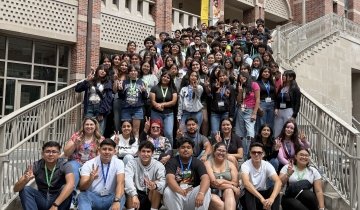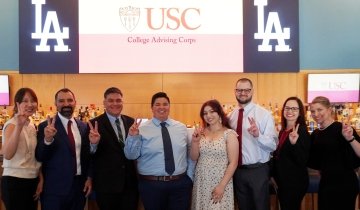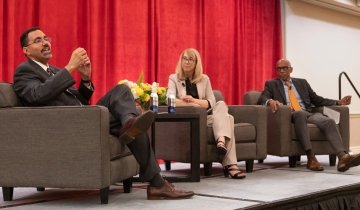
Led by Dr. Estela Mara Bensimon and Alicia C. Dowd, the Center for Urban Education (CUE) uses socially conscious research to close the racial-ethnic equity gap and has developed the process, data and benchmarking tools to assist higher education systems and institutions in achieving President Obama’s college completion goals, especially for students from underserved racial and ethnic communities.
In partnership with the National College Access Network (NCAN), CUE is lending its expertise to a project aimed at improving college readiness programs at two high schools in Boston, Massachusetts. This will mark the first time that CUE will use the innovative Equity Scorecard™ at the high school level. Historically, the Center’s focus has been on two-and four-year colleges to address racial and ethnic disparities in educational outcomes.

The project will explore the alignment between student academic achievement outcomes and college access intervention programs using participatory action research, a method of creating new knowledge that involves a group of practitioners coming together to conduct collaborative research through an inquiry process into their own organizations’ practices.
Improving this alignment is critical because there’s a significant knowledge and achievement gap between the supplemental services offered by college access programs and the outcome goals set by high schools. This disconnect means that school leaders are often not fully aware of who is receiving services, what services the students are receiving, or if the services are being provided to the students who need them the most.
“For many in the underserved population, college access programs represent the only avenue to receive assistance in navigating the college preparation and application process,” said Benismon, a professor of higher education at USC’s Rossier School of Education. “CUE’s research-driven data tools will make it possible to assess, by race and ethnicity, who gets access to which college access programs and the Equity Scorecard™ will make it possible for the high schools to know the progress being made by students of color in getting prepared for college.”
The two high schools involved in the pilot project – Community Academy of Science and Health and East Boston High School – have a diverse student population, a need to improve student academic achievement, and multiple college access programs with supplemental student support services.
The project will involve an inventory of college access services, along with the identification of targeted students; articulation of the school’s desired outcomes through interviews and focus groups; a student survey to assess the utilization of college access services; and the examination of current student achievement levels to identify deficiencies among subgroups.
Researchers from CUE will train high school administrators, counselors and teachers to examine their own data using the Equity Scorecard™ to improve college going rates.
The culmination of the project will include a jointly produced report on the results of the pilot project and outline the likelihood of CUE’s processes being replicated in high school settings.
The impetus for the project began during the summer of 2009 when Dr. Tia McNair, the assistant director of NCAN, became a Fellow during the Association for the Study of Higher Education (ASHE) Institutes on Equity and Critical Policy Analysis organized by CUE and funded by the Ford Foundation. The session she attended, “Principles and Methods of Participatory Critical Action Research,” was led by Bensimon and Dowd.
McNair attended the same Institute the following summer but the focus for her had changed. This time, the Institute functioned as an initial three-day training session to familiarize the participants of the Boston initiative with the philosophical and theoretical underpinnings of participatory action research and give them dedicated time to develop their school-based projects in detail.
”Everyone on the team plays a critical role,” said McNair, who is based in Washington, D.C.” It’s groundbreaking and it’s empowering to people who interact with students on a daily basis and who want to participate on a research team to address disparities. Solutions are based on common knowledge and common understanding. It’s a more realistic way of looking at how ideas are generated and how conclusions are being created and implemented.”
Statistics point to the fact that only 35% of Boston Public Schools college-bound graduates from the class of 2000 had earned college degrees by 2007.
College access programs address a significant need in many schools. These programs provide targeted services (e.g., tutoring/academic enhancement, career exploration, ACT/SAT test preparation, college admissions and financial aid counseling, scholarships, mentoring, etc.) to low-income, first-generation, and/or racially and ethnically diverse high school students.
Given their heavy workload and limited resources, many school professionals cannot deliver these services. According to the National Center for Education Statistics (NCES), the student-to-counselor ratio was 475:1 for the 2006-2007 school year. The American School Counselor Association recommends a ratio of 250:1. The result is many students are underserved.
“The Equity Scorecard is exactly what our country needs right now, exactly what is needed to drive change, especially with the changing demographics,” McNair said. ”You have to look at data this way. It’s not even an option anymore.”



